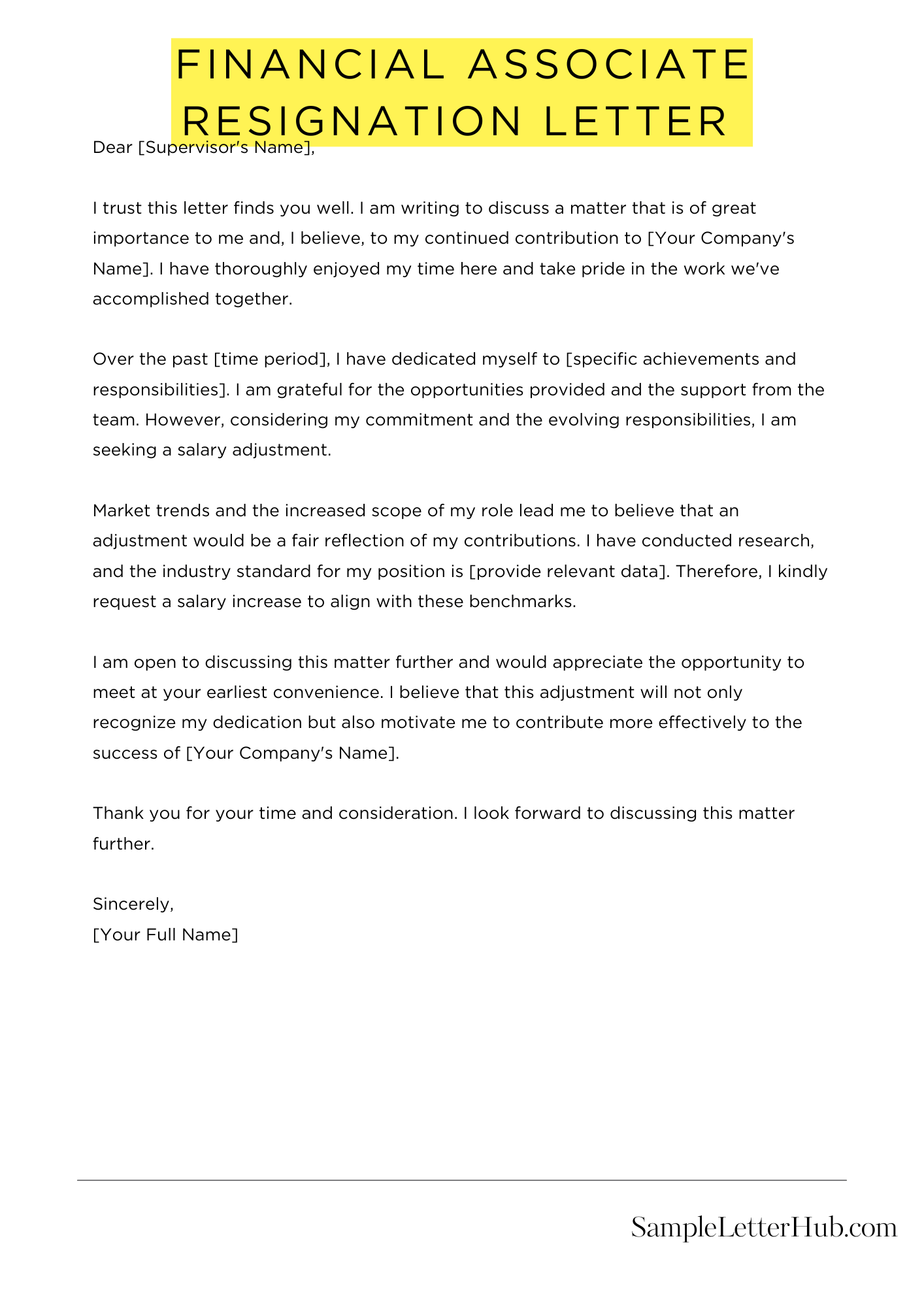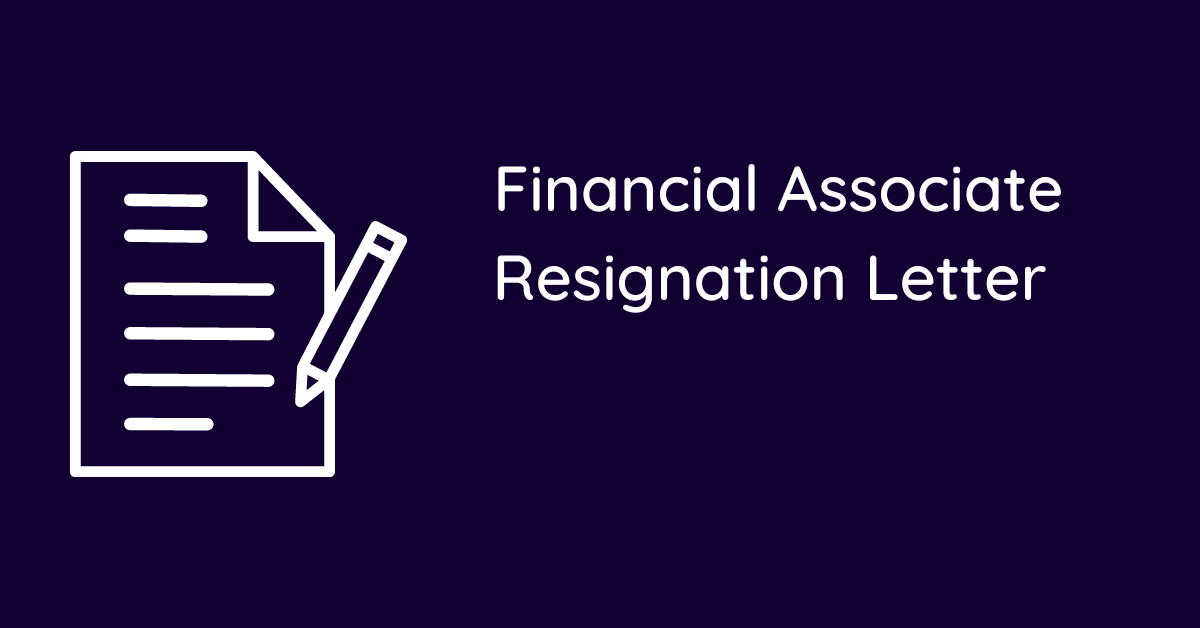When it comes to leaving a job, one way to do it is to write a clear and professional resignation letter. This letter should explain your decision to leave and be polite and humble in tone. In this blog article, we will share an example of a financial associate resignation letter with you.
A financial associate resignation letter is a formal document that you submit to your employer when you are leaving your job. It should be written in a clear and concise manner, and it should state your reason for leaving. It is also important to be polite and humble in your letter, as you want to leave a good impression on your employer.
Below, we have shared a template/example financial associate resignation letter that you can use. This letter is designed to help you write a clear and professional resignation letter that will leave a good impression on your employer.
Financial Associate Resignation Letter
Dear [Recipient Name],
Please accept this letter as formal notification that I will be resigning from my position as Financial Associate at [Company Name], effective two weeks from today, [Date].
I have enjoyed my time at [Company Name] and am grateful for the opportunities and experiences I have gained during my tenure. I have learned a great deal and have developed valuable skills that will serve me well in my future endeavors.
I wish you and [Company Name] all the best in the future.
Sincerely,
[Your Signature]
Short Financial Associate Resignation Letter Sample
Please accept this letter as formal notification that I am resigning from my position as Financial Associate at [Company Name]. My last day of employment will be [Your Last Day]. Thank you for the opportunity to grow and learn during my time here. I wish you and the company continued success. I am happy to assist in the transition process to ensure a smooth handover of my responsibilities.
I wish you all the best with your financial associate resignation letter.
When it’s time to say farewell, expressing your gratitude and best wishes can make the transition smoother:

How to Write a Financial Associate Resignation Letter
1. Start with a Formal Salutation
Begin your letter with a formal salutation, such as “Dear [Manager’s Name].”
2. State Your Intention to Resign
Clearly state your intention to resign from your position as a Financial Associate. Include the date of your last day of employment.
3. Express Gratitude
Take this opportunity to express your gratitude for the opportunities and experiences you have gained during your time with the company. Mention specific projects or accomplishments that you are proud of.
4. Offer to Assist in the Transition
Let your manager know that you are willing to assist in any way possible to ensure a smooth transition during your departure. Offer to train your replacement or provide documentation on your responsibilities.
5. Close with a Professional Tone
End your letter with a professional tone, thanking your manager for their support and wishing them and the company all the best in the future.
6 Most Frequently Asked Questions About Financial Associate Resignation Letters
When it comes to resigning from your position as a financial associate, it’s crucial to do so professionally and effectively. Here are the six most frequently asked questions and answers to guide you through the process:
1. What is the proper format for a financial associate resignation letter?
A financial associate resignation letter should include your name, address, date, company name, and manager’s name. State your intention to resign, your last date of employment, and express gratitude for the opportunity. Keep it brief, professional, and to the point.
2. How much notice should I give?
The standard notice period for a financial associate is two weeks. However, it’s always advisable to check your employment contract or company policy for specific requirements. Providing ample notice demonstrates professionalism and allows for a smooth transition.
3. What should I include in the body of the letter?
In the body of your resignation letter, you can briefly express your appreciation for the company and your manager. You can also mention any specific projects or experiences you’ve enjoyed during your time there. However, avoid going into too much detail or providing negative feedback.
4. Do I need to provide a reason for leaving?
It’s not necessary to provide a detailed reason for leaving in your resignation letter. However, you can briefly state that you’re pursuing a new opportunity or seeking a different challenge. Keep it professional and avoid burning bridges.
5. Should I offer to help with the transition?
Offering to assist with the transition during your notice period shows initiative and professionalism. You can offer to train your replacement, document your responsibilities, or provide any other support that would make the handover process smoother.
6. What are some common mistakes to avoid?
Some common mistakes to avoid in a financial associate resignation letter include being unprofessional, providing too much detail, or expressing negativity. Always maintain a positive and respectful tone, and focus on the future rather than the past.
Before making the decision to resign from your job, it’s essential to consider the legal aspects:
Understanding your emotions after quitting your job is important. Explore why you might be feeling sad:
Related
- Resignation letter sample
- Forced resignation letter
- Resignation letter due to going abroad
- Resignation letter due to marriage
- Resignation letter due to other opportunity
- Resignation letter due to mistake

